-
 Bitcoin
Bitcoin $115000
1.10% -
 Ethereum
Ethereum $3719
2.93% -
 XRP
XRP $2.997
2.56% -
 Tether USDt
Tether USDt $1.000
0.02% -
 BNB
BNB $766.7
0.98% -
 Solana
Solana $169.6
3.97% -
 USDC
USDC $0.9999
0.00% -
 TRON
TRON $0.3391
1.82% -
 Dogecoin
Dogecoin $0.2060
3.53% -
 Cardano
Cardano $0.7429
2.91% -
 Hyperliquid
Hyperliquid $38.02
1.70% -
 Stellar
Stellar $0.4021
3.23% -
 Sui
Sui $3.515
3.31% -
 Bitcoin Cash
Bitcoin Cash $574.2
2.68% -
 Chainlink
Chainlink $16.85
3.10% -
 Hedera
Hedera $0.2461
1.54% -
 Ethena USDe
Ethena USDe $1.001
0.02% -
 Avalanche
Avalanche $22.28
1.26% -
 Litecoin
Litecoin $118.3
1.25% -
 UNUS SED LEO
UNUS SED LEO $8.923
-0.75% -
 Toncoin
Toncoin $3.255
2.35% -
 Shiba Inu
Shiba Inu $0.00001239
2.42% -
 Uniswap
Uniswap $9.834
3.77% -
 Polkadot
Polkadot $3.690
2.48% -
 Dai
Dai $1.000
0.02% -
 Monero
Monero $282.9
-3.30% -
 Bitget Token
Bitget Token $4.367
0.70% -
 Cronos
Cronos $0.1454
5.37% -
 Pepe
Pepe $0.00001055
3.60% -
 Ethena
Ethena $0.6156
8.72%
Is it legal to make a profit by reselling USDT?
The legality of reselling USDT hinges on factors like jurisdiction, exchange regulations, and the method of resale, but it's generally permissible with appropriate due diligence and compliance with regulations.
Jan 24, 2025 at 10:37 am
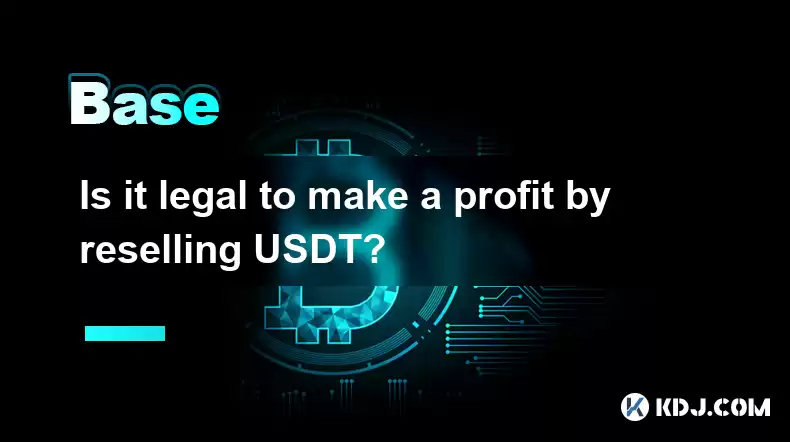
Key Points:
- Understanding the Legality of Reselling USDT
- Advantages of Reselling USDT
- Disadvantages of Reselling USDT
- Steps to Resell USDT Legally
- Cautions for Reselling USDT
- FAQs on USDT Reselling
Is it Legal to Make a Profit by Reselling USDT?
Understanding the Legality of Reselling USDT
The legality of reselling USDT depends on various factors:
- Jurisdiction: Cryptocurrency regulations vary by country, so check the laws in your specific location.
- Exchange or Platform: Some exchanges or platforms explicitly prohibit or restrict USDT reselling.
- Method of Reselling: The method of reselling, such as over-the-counter (OTC) or exchange markets, can impact its legality.
Advantages of Reselling USDT
- Market Demand: USDT is a widely accepted stablecoin with high demand, providing potential for profits.
- Easy Accessibility: USDT is readily available on major cryptocurrency exchanges.
- Low Price Volatility: USDT maintains a stable value relative to the US dollar, providing a less volatile asset to resell.
Disadvantages of Reselling USDT
- Regulatory Risks: Reselling USDT can attract regulatory scrutiny, especially if the transaction is large or involves illegal activities.
- Competition: The USDT reselling market is highly competitive, and profits are likely to be marginal unless large volumes are traded.
- Transaction Fees: Reselling USDT involves transaction fees on exchanges and platforms, reducing potential profits.
Steps to Resell USDT Legally
- Choose a Legitimate Exchange or Platform: Verify the exchange's or platform's license and compliance with regulations.
- Check Reselling Restrictions: Familiarize yourself with the exchange's or platform's terms and conditions regarding USDT reselling.
- Follow KYC/AML Procedures: Most exchanges require Know Your Customer (KYC) and Anti-Money Laundering (AML) verification for large transactions.
- Set Realistic Profit Margins: Avoid excessive profit margins to reduce the risk of legal issues.
- Record Transactions: Maintain a record of all USDT reselling transactions for compliance and tax purposes.
Cautions for Reselling USDT
- Potential for Price Manipulation: Resellers may attempt to manipulate the price of USDT to increase their profits.
- Money Laundering Risks: USDT can be used for money laundering, and resellers should ensure transactions are not linked to illegal activities.
- Cybersecurity Risks: Resellers should implement strong cybersecurity measures to protect against hacking and theft.
FAQs on USDT Reselling
Q: What are the tax implications of reselling USDT?
A: Tax laws on cryptocurrency vary by jurisdiction. Consult with a tax professional for guidance.
Q: Is it safe to resell USDT over-the-counter (OTC)?
A: OTC transactions involve higher risks, including the potential for fraud and illegal activities. Conduct thorough due diligence before engaging in OTC trades.
Q: Can I use USDT to transfer funds internationally?
A: Yes, USDT can be used for international fund transfers due to its stability and wide acceptance. However, check with your bank or financial institution regarding any restrictions.
Disclaimer:info@kdj.com
The information provided is not trading advice. kdj.com does not assume any responsibility for any investments made based on the information provided in this article. Cryptocurrencies are highly volatile and it is highly recommended that you invest with caution after thorough research!
If you believe that the content used on this website infringes your copyright, please contact us immediately (info@kdj.com) and we will delete it promptly.
- IREN Overtakes: A New King in the Bitcoin Miner Hashrate Race?
- 2025-08-07 16:31:29
- Memecoins Mania: Whales Eye Pepe Dollar (PEPD) as Bonk Cools Off, While MoonBull Hogs the Spotlight!
- 2025-08-07 16:51:17
- Unilabs, PEPE, and Investment Risk: Navigating the Crypto Hype
- 2025-08-07 16:31:29
- Meme Coin Mania: Rug Pulls, CZ-Inspired Tokens, and the Wild West of Crypto
- 2025-08-07 16:57:14
- HashFlare Founders Face the Music: Jail Time Looms?
- 2025-08-07 14:30:12
- Pepeto's Pounce: Meme Coin Mania Meets Blockchain Infrastructure
- 2025-08-07 15:10:12
Related knowledge
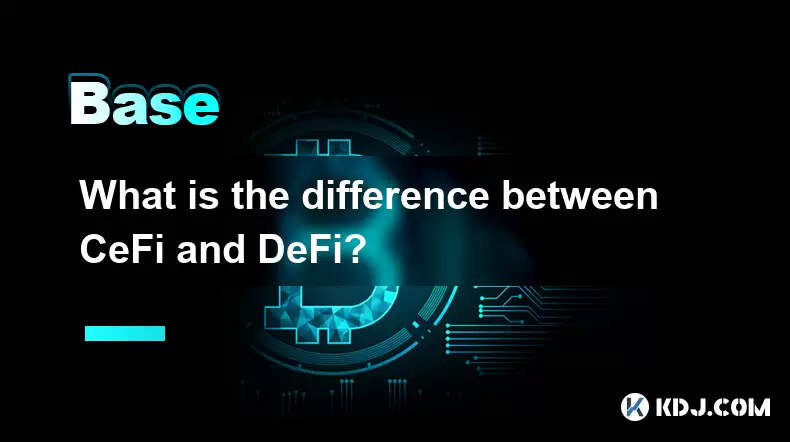
What is the difference between CeFi and DeFi?
Jul 22,2025 at 12:28am
Understanding CeFi and DeFiIn the world of cryptocurrency, CeFi (Centralized Finance) and DeFi (Decentralized Finance) represent two distinct financia...

How to qualify for potential crypto airdrops?
Jul 23,2025 at 06:49am
Understanding What Crypto Airdrops AreCrypto airdrops refer to the distribution of free tokens or coins to a large number of wallet addresses, often u...
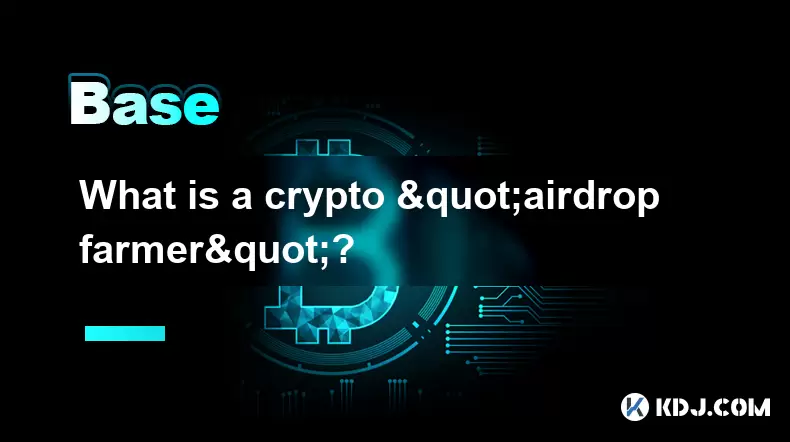
What is a crypto "airdrop farmer"?
Jul 24,2025 at 10:22pm
Understanding the Role of a Crypto 'Airdrop Farmer'A crypto 'airdrop farmer' refers to an individual who actively participates in cryptocurrency airdr...
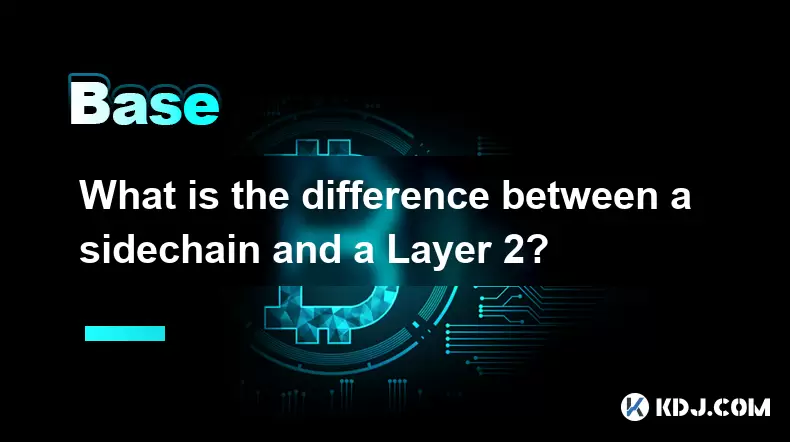
What is the difference between a sidechain and a Layer 2?
Jul 20,2025 at 11:35pm
Understanding the Concept of SidechainsA sidechain is a separate blockchain that runs parallel to the main blockchain, typically the mainnet of a cryp...

What is the Inter-Blockchain Communication Protocol (IBC)?
Jul 19,2025 at 10:43am
Understanding the Inter-Blockchain Communication Protocol (IBC)The Inter-Blockchain Communication Protocol (IBC) is a cross-chain communication protoc...
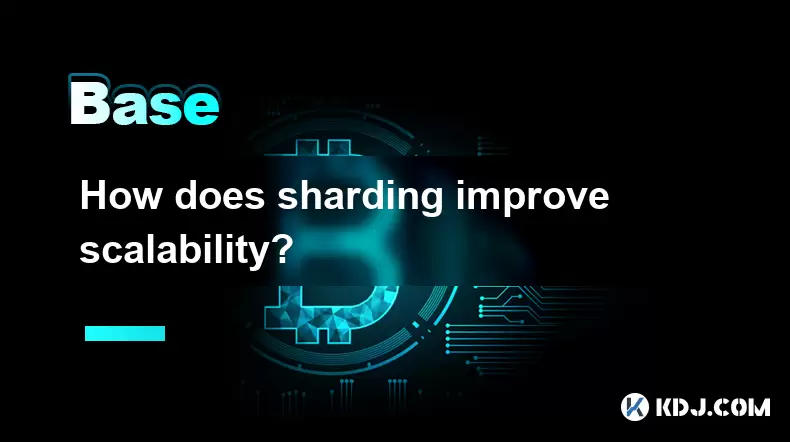
How does sharding improve scalability?
Jul 20,2025 at 01:21am
Understanding Sharding in BlockchainSharding is a database partitioning technique that is increasingly being adopted in blockchain technology to enhan...

What is the difference between CeFi and DeFi?
Jul 22,2025 at 12:28am
Understanding CeFi and DeFiIn the world of cryptocurrency, CeFi (Centralized Finance) and DeFi (Decentralized Finance) represent two distinct financia...

How to qualify for potential crypto airdrops?
Jul 23,2025 at 06:49am
Understanding What Crypto Airdrops AreCrypto airdrops refer to the distribution of free tokens or coins to a large number of wallet addresses, often u...

What is a crypto "airdrop farmer"?
Jul 24,2025 at 10:22pm
Understanding the Role of a Crypto 'Airdrop Farmer'A crypto 'airdrop farmer' refers to an individual who actively participates in cryptocurrency airdr...

What is the difference between a sidechain and a Layer 2?
Jul 20,2025 at 11:35pm
Understanding the Concept of SidechainsA sidechain is a separate blockchain that runs parallel to the main blockchain, typically the mainnet of a cryp...

What is the Inter-Blockchain Communication Protocol (IBC)?
Jul 19,2025 at 10:43am
Understanding the Inter-Blockchain Communication Protocol (IBC)The Inter-Blockchain Communication Protocol (IBC) is a cross-chain communication protoc...

How does sharding improve scalability?
Jul 20,2025 at 01:21am
Understanding Sharding in BlockchainSharding is a database partitioning technique that is increasingly being adopted in blockchain technology to enhan...
See all articles

























































































